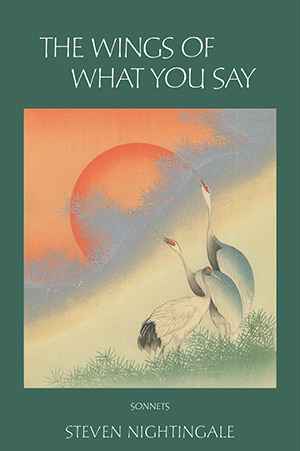
Order: |
Reviews“We soar. We go past history because these ninety-nine sonnets want us, in this life, within all life. The range is expansive, Petrarch’s precise meter, familiar and public, almost as if we do have wings, angelic, earth-hued, radiant. Here we find our call, our meaning and dreaming. A 21st century Neruda, a poet’s and people’s masterpiece.” “Steven Nightingale’s love for the sonnet has turned it molten, supple, fashioned it newly for new purposes. He opens a peacock’s tail of nature and human nature in the “strange initiatives” of these marvelous poems, makes them into Bhakti sonnets, truly devotional literature.” Beauty, Soul, World, these words—common as bread yet lustrous, mysterious, weave through the aptly named Steven Nightingale’s lovely, soulful, and world-rich collection of sonnets. |

IntroductionIn the course of many readings of sonnets in the last years, certain questions, on occasion, have been directed to this bedraggled sonneteer, to wit: What on earth are you doing? Such radical declarations in verse, in so antique a form…isn’t this rather sentimental? Aren’t these subjects a bit fantastical? Impossible? I think these inquiries entirely justified, since the practice of writing a sonnet a day is somewhat uncommon presently. It is a useful form, a pattern and an offering, capable of strange initiatives. One thinks of the DNA molecule, which might make a fingertip, a brain cell, a valve in the heart. One thinks of a circuit board, used to decode the light of distant stars, to investigate the genetics of families of flowering plants. Yet we know more about distant stars, flowering plants, and neural networks, than we do about other subjects common in our daily experience. Say, for instance, beauty. Or grace, the minutiae of our pleasures, the pressure of history, the precise exaltations of spirit; or even the passage of light through a glass of water. Our experiments have overcome our experience. Our power has debased our understanding. Our politics hold in contempt our hopes for safety. And doctrine and habit confine our sense of the sacred. The sonnet, like any art form, is at the beginning of its powers. For it can be used to answer an urgent calling: to know, beyond material progress, the beauty, grace, and understanding that can give form and meaning to such progress. This calling is ordinary, made daily, and made to all of us. If we answer, what happens then is what always happens: the mindful changes within that bring us to work in service of life, in honor of life, in thankfulness for life. Without such a way forward, our progress will be our undoing, and our future will bring us so atrocious and unspeakable a degeneracy, that the catastrophes of the past centuries will look quaint. These, I think, are the stakes. If this is sentiment, then poetry requires it. If this is overreaching, then I seek more companions, that our reach has yet more scope and mischief. If this is an impossible project, then we must thrive and laugh, and outfox impossibility together. When it is inquired why I am hopeful, I say it is because I know that there is no force on earth so malevolent that it can resist you, reader, with a book in your hand. If these sonnets have a light within them, it is because you have illuminated them; they show just the light you give. I look around at the incomparable earth, and I know that what gives us a chance is the way all its beauties have been entrusted to you. I write because your work and life offer a way forward to life upon an earth restored, lustrous, cherished; to a community where justice comes first and generosity is common as paper; to the hour when we watch our children, hand in hand, in the morning light, walk forth onto the fields of their rejoicing. —S. N. |
|
